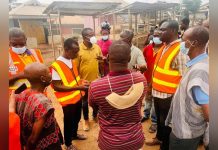Africa-Press – Ghana. The 2022 Ghana Demographic and Health Survey (GDHS) for the Northern Region shows that 33 percent of children under five suffer from stunted growth, while 11 percent are underweight.
The same statistics indicated that anaemia affected 71 percent of children aged 6–59 months and 53 percent of women of reproductive age.
Food security analysis
The 2020 Comprehensive Food Security and Vulnerability Analysis (CFSVA) by the Ghana Statistical Service (GSS) ranks Karaga District as the second most food insecure district in Ghana, with 75.9 percent of the population classified as food insecure.
This makes the area highly vulnerable to malnutrition. Unfortunately, women farmers, who form the backbone of local food production, are facing increasing challenges in accessing fertile farmlands for cultivation, deepening the nutritional crisis.
Degraded lands: Untapped asset
Degraded lands are agricultural areas that have suffered significant declines in productivity and health due to factors such as soil erosion, nutrient depletion, overgrazing, and water scarcity.
The Food and Agriculture Organization (FAO) defines them as lands that have lost their productive capacity due to human activity or natural processes.
Global experiences show that these lands, though seemingly barren, can be brought back to life. For instance, an FAO case study in 2020 revealed how Ethiopia successfully reclaimed degraded lands through community-led watershed management and agroforestry, boosting crop yields and dietary diversity.
In 2019, India’s National Rural Employment Guarantee Scheme transformed degraded lands into community vegetable gardens, directly supplying households and schools with nutrient-rich foods. These successes demonstrate that land restoration is not only possible, but also transformative when communities and policies align.
Dr Edwin Korbla Akley, a Soil Microbiologist at the Council for Scientific and Industrial Research – Savanna Agricultural Research Institute (CSIR–SARI), told that degraded lands can be revived through scientific management.
“Degraded soils are not dead soils; they are simply sick soils. With soil microbes, compost, green manure, and crop rotation, we can restore biological activity and nutrient content,” Dr Akley explained, and stressed that once rehabilitated, these lands could support diverse crops such as legumes, vegetables, and biofortified cereals that improve household nutrition.
Local and International Interventions
In Karaga, some organizations have begun initiatives to address food security and malnutrition. The World Food Programme (WFP), in partnership with the Savannah Women Integrated Development Agency (SWIDA-Ghana), is piloting land restoration projects in selected communities, focusing on the use of organic manure, agroforestry, and conservation agriculture to boost food production.
The United Nations Children’s Fund (UNICEF) has implemented nutrition-sensitive agriculture initiatives in parts of the Northern Region, promoting the cultivation of orange-fleshed sweet potatoes and iron-rich legumes. UNICEF has also supported community-based nutrition education and screening exercises for children under five to detect malnutrition early.
Mr Mohammed Iddrisu, Karaga District Director of the Ministry of Food and Agriculture (MoFA), noted that reclaiming degraded lands could be a game changer. “When we rehabilitate these lands using organic manure, cover crops, and conservation agriculture, we can support women farmers to produce more nutrient-rich crops, which directly addresses malnutrition and improves incomes,” he said.
Hajia Alima Sagito Saeed, Executive Director of SWIDA-Ghana, who explained the predicaments women go through in accessing land, emphasized that land access remained major barrier for women farmers.
“Women in Karaga have the skills and the will to farm, but land is the main barrier. Reclaiming degraded lands boosts food production and empowers women economically. Empowered women are more likely to invest in their children’s health and education,” she stated.
For many women, the issue is deeply personal. “Every year, I struggle to find fertile land to plant vegetables. If degraded lands near our homes are restored, I can grow food for my children and even sell some to pay school fees,” said Mariama Fuseini, a smallholder farmer from Nyansabga.
Gaps in addressing malnutrition and food security
Despite these efforts, there are still significant gaps to be filled. Scaling them up to reach other vulnerable communities would allow more women and girls to benefit from land restoration and improved nutrition.
Funding constraints remain a challenge, as land rehabilitation is resource-intensive and requires sustained investment.
Land tenure insecurity continues to hinder progress, with many rural women lacking guaranteed rights to reclaimed lands, discouraging long-term farming investments.
Existing national policies on land administration, while well-intentioned, often fail to fully protect women’s rights at the community level, especially in northern Ghana, leaving them dependent on traditional arrangements that can change abruptly.
Moreover, climate shocks, droughts, and erratic rainfall remain serious threats to agricultural productivity, even on restored lands, underscoring the need for climate-smart agricultural practices alongside restoration efforts.
Impact on achieving Sustainable Development Goal 2 (Zero Hunger)
Reclaiming degraded lands in Karaga aligns directly with Sustainable Development Goal 2, which aims Zero Hunger by 2030. Rehabilitation efforts increase the production of diverse nutrient-rich crops and also improve household food security and reduce malnutrition.
Securing women’s access to productive farmland would move the district closer to eliminating hunger and achieving year-round access to adequate, safe, and nutritious food for all.
Way Forward
It is important to prioritise community-led land rehabilitation programmes that mobilize women’s groups to adopt agroforestry, composting, and cover cropping.
There should be deliberate policy direction targeted at supporting women farmers by providing seeds, organic fertilizers, and irrigation facilities to help reclaim degraded lands.
Equally crucial is the strengthening of partnerships, engaging more development agencies such as WFP and SWIDA-Ghana to expand restoration projects across the district.
Government must place greater emphasis on nutrition-sensitive agriculture that promotes nutrient-rich crops like orange-fleshed sweet potatoes, cowpeas, and leafy greens.
Land rights reforms must be enforced to ensure that women have secure tenure over restored lands, encouraging them to invest in sustainable use. Without secure rights, restoration gains risk being short-lived.
While there were no readily available statistics on the number of degraded lands in Karaga, it is necessary to establish clear data on the degraded lands in the area and key activities leading to that situation.
While overgrazing, shifting cultivation, and nutrient depletion are major factors, sand winning could also be a significant contributor to land degradation, and tackling it requires firm regulation, alternative livelihoods, and community vigilance.
Chiefs, opinion leaders, the District Assembly, the Ministry of Food and Agriculture, and the Ghana Health Service all have roles to play.
Chiefs and traditional authorities can provide access to degraded lands and enforce responsible land use practices, while MoFA can provide technical guidance for restoration.
The District Assembly must enforce by-laws to regulate harmful practices such as sand winning, and the Ghana Health Service should continue to link nutrition outcomes with agricultural production. Opinion leaders and community groups can also mobilize local participation in communal activities to ensure that reclamation efforts are community-owned and sustainable.
By combining scientific soil restoration with women’s empowerment, Karaga can transform degraded lands into engines of nutrition and resilience. With immediate and sustained action, one of the district’s greatest challenges can be turned into a pathway toward lasting food security.
Source: Ghana News Agency
For More News And Analysis About Ghana Follow Africa-Press







